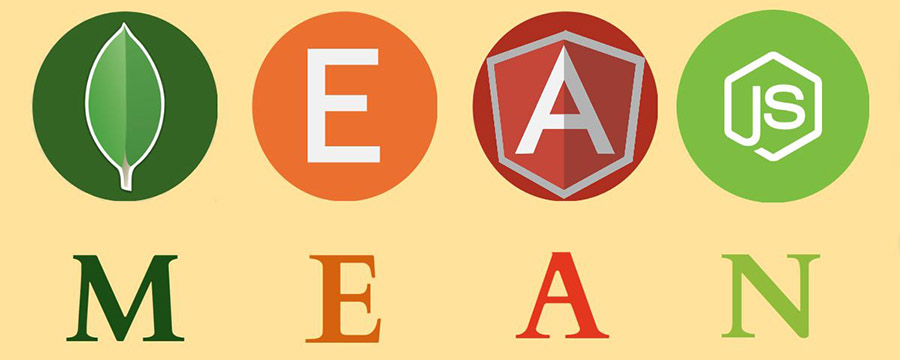The Basics of the MEAN Stack
The technology field is full of acronyms, and web development is not exception. Online forums and daily conversations are filled with jargon such as FTP, POP, and DNS. Today, we will look at an acronym that might seem scary at first, but actually stands for a useful set of tools JavaScript-based that web developers can use, the MEAN Stack.

What Does MEAN Stack Stand For?
MEAN Stack stands for the components that make it up: MongoDB, ExpressJS, AngularJS, and NodeJS. This order is used to make MEAN easy to remember. In actuality, NodeJS should be installed first. Once node.js has been properly installed, MongoDB can be set up on the server.
Now we are ready to begin developing our web applications using AngularJS as the scripting language.
Since all of these components are coded in JavaScript, applications developed using the MEAN Stack can be written for server-side and client-side environments using the same scripting language. It should be noted that some components of the MEAN Stack are interchangeable with other JavaScript frameworks. For instance, the MEEN Stack utilizes EmberJS in place of AngularJS.
We will leave these variations for a later time. Let’s take look into the individual components of the standards MEAN Stack.
MongoDB
MongoDB is an alternative database that is categorized as a NoSQL database that does not use the usual table-based relationship structure. It serves as the backend of applications developed using the MEAN Stack. The avoidance of this typical database structure translates into smoother data integration, and thus, smoother running applications. MongoDB is free, open-source, and ranks fourth in terms of web database usage.
ExpressJS
ExpressJS is a framework for NodeJS (which will be described later) specifically designed for the development of web applications. It serves as the industry standard server framework for NodeJS. Express streamlines management of server functions such as routing and managing requests, and allows applications developed using the MEAN Stack to follow the model-viewer-controller (MVC) paradigm.

AngularJS
AngularJS is JavaScript-based framework used for developing web applications. It serves as the frontend of the MEAN Stack. Angular makes the creation of MVC applications easy. All that a developer has to do is write the code for each component, then Angular will tie them together. Gone are the days of needing to spend additional manhours writing the code that ties each component together. Getter and setter functions (known as accessors and mutators) will not have to be written, which can save on time. Just let Angular serve as a mediator, making the development of a frontend much easier.
NodeJS
NodeJS is a speedy framework used to develop server-side web applications. It is an open-sourced framework written in JavaScript, so developers can easily modify or create modules for it. Node can make servers run far more efficiently than the typical Apache-based LAMP Stack. This alone makes it worth looking into, especially for webmasters that value having low website loading times.
In the MEAN Stack, NodeJS serves as the runtime environment for event-driven applications. Event-driven applications allow servers to run more efficiently, combining the simplicity of using JavaScript with the power of Linux networking.
Why Use the MEAN Stack
The first reason why the MEAN Stack is an excellent tool for web developers is that each component utilizes JavaScript. This makes both coding and integration easier than using one programming language for the server and another for the client.
Low filesizes is another perk to using the MEAN Stack. As you know, long loading times can make users unhappy and drive them away, having a negative effect on your site’s SEO rating and ability to make conversions. The larger JavaScript libraries are, the longer they will take to download and to be used by the browser. MEAN reduces this loading time since it has a compressed library with a small filesize.
Although the MEAN Stack is relegated to JavaScript (which makes things simpler to implement), developers are not restricted to the usage of a single flavor of JavasScript. As previously stated, developers may opt to use an alternative to AngularJS, such as EmberJS or BackboneJS. Alternative databases, like CouchDB, can also be used in lieu of MongoDB. You have to admit though, CEBN just doesn’t sound as memorable as MEAN does.
Conclusion
The MEAN Stack allows web developers to create scalable, efficient applications with great ease. This software bundle is completely open-source and free, so it can be installed and used without paying a dime – apart from the fee with your hosting company of course. Webmasters that would rather employ the services of experts than take the time to learn how to develop with the MEAN Stack themselves may find themselves paying quite a bit to get their needs met.
If MEAN sounds too, well, mean, to wrap your head around, do not worry. If you do not want to hire a “ninja” to do the job for you, there are plenty of free tutorials online that will teach you the ends and outs of the MEAN Stack!
